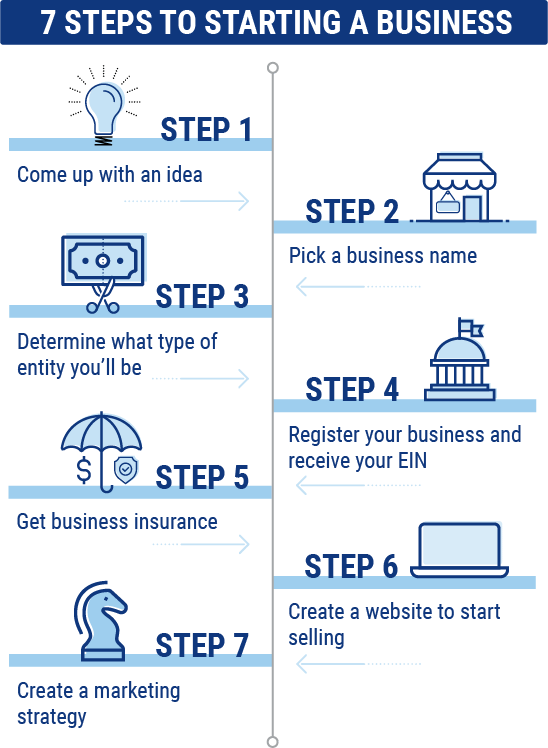How to Start an Online Business in 7 Steps

Cara Carlone is a licensed P&C agent with 20 years of experience. She has her P&C license in RI and TX and holds CPCU, API, and AINS designations.

Thanks to the internet’s ability to reach a worldwide audience instantly, starting an online business has never been easier. Since the pandemic of 2020, more people than ever before have been inspired to work from home or become their own boss. If the world of e-commerce is calling to you, there are some practical steps you can take to bring your online business idea into reality.
Before you open your online business's proverbial doors to the public, you'll also need to ensure you're protected with sufficient business insurance. A local independent insurance agent can help you get set up with all the coverage you need. Until then, check out our guide on how to start an online business in seven easy steps.
Pros and Cons of Starting an Online Business
Running an online business can be extremely rewarding, but it's not a venture to be undertaken lightly. There are still plenty of risks that must be considered beforehand. As with any other type of business, starting and running an online business has a few pros and cons to weigh.
| Pros: | Cons: | ||||
|---|---|---|---|---|---|
|
|
||||
|
|
||||
|
|
||||
|
|
||||
|
|
||||
|
|||||
|
Low-risk operations and minimal start-up costs and monthly expenses can be enticement enough for many individuals hoping to tap into their online entrepreneurial spirit. However, don't take the possible cons too lightly. Starting your own online business means you'll have to handle all matters, including potential legal issues, until you have enough capital to delegate certain tasks. But if the pros outweigh the cons, go ahead and move forward with your online business plan.
The Ultimate Guide to Starting an Online Business: 7 Easy Steps
Owning an online business can be great for a number of reasons, and the ease of getting it all started is at the top of the list for many eager professionals. Whether you’re a newbie or an expert entrepreneur, there are a few basic steps you can follow to start any online business. Different markets may require extra research and additional preparations, but overall, you can follow this how-to step-by-step guide.

Step One: Come Up with a Viable Online Business Idea
Businesses that can create a profit and sustain themselves are considered viable. To create a successful online business, business owners must first assess whether their idea is actually feasible. Consider what you want to accomplish, such as selling goods or services, and how much demand there is for your business's potential customers. A few questions you can ask yourself include:
- Do your physical products or services solve a problem for enough people?
- Will your potential customers be willing to pay the amount you're hoping to charge?
- Will your target audience understand what you're offering or selling?
- How much will it cost your business upfront to market your product or service?
- Is the market already saturated with similar products or services, or do yours stand out enough?
Like any other business, you must determine if there's enough demand for your products or services. If you'll be creating, uploading, and selling online courses, for example, you'll need to ensure that your courses offer different or higher quality information than other existing classes on the same subject. If you'll be creating and running an online store, you'll need to ensure that your products are attractively priced and differ enough from your competitors.
Conduct thorough market research in your niche. Research your target audience and competition so you know what your competitors are selling and how much they charge. No one will want to buy your products or services if they can find the same thing cheaper somewhere else, or if they believe a competitor's product is more high-quality than yours.
Step Two: Pick a Business Name
Next, it's time to choose a smart business name for your e-commerce business. Since your business will exist online, it's critical that you ensure you pick a name that's also available to be used as a web address. You'll need to conduct research to ensure your business name can be officially registered as all of the following:
- A legal business in your state
- An online domain
- A username on social media
Consider what you want your business's domain name to be first and foremost since your business will exist primarily online. You want a name that's easy to spell, type, and remember, and one that's fitting for your goods or services. If you run an online store, consider what types of products you sell when choosing your business name. What you call your business should clearly indicate what customers can expect to get from you. You'll also want something unique so it will be brought up by search engines at the top of the queue.
Step Three: Determine What Type of Business Entity You'll Be
One of the first things you’ll need to do when you start an online business is determine your entity type. Your business entity dictates how the government will view your business and, ultimately, how you’ll be taxed. Here are the most common types of business entities to choose from:
- Sole proprietorship: This refers to a business owned by one person. A sole proprietorship doesn’t require any forms or legal work to obtain.
- Partnership: This refers to a business owned by two or more people. You’ll be required to register your business with your state and establish an official business name.
- Corporation: This refers to an independent business that includes multiple shareholders. The most common is “C Corporation,” which allows you to deduct taxes like an individual. Corporations provide limited liability.
- Limited liability company (LLC): This refers to a business that's a blend of a sole proprietorship and a corporation. LLCs must have a managing member, and unlike corporations, they are taxed as separate business entities. LLCs offer limited liability but are not as complex as corporations.
If you’d like to learn a bit more about each of these entities, you can conduct further research online, such as on your local Secretary of State’s website.
Step Four: Register Your Business and Receive your EIN
Online businesses need many of the same legal documents as brick-and-mortar companies to be properly formed, registered, and recognized by the government. These documents can include the following:
- Certificate of incorporation
- Business license
- Taxpayer ID/Tax Identification Number
- Non-disclosure agreement
- Copy of license for the service support facility and/or a recent inspection report
- Operating agreement for LLCs
- Certificate of business insurance
- Online terms of use
- Online privacy policy document (necessary for online payment portals)
- Memorandum of Understanding (MoU)
- Building license
- Franchise or trademark license (optional)
Your business must be officially registered with the government to avoid legal complications once you start making money. It's crucial to comply with all federal and state tax requirements during this process. Working with a trusted CPA and/or attorney can be extremely helpful if you're unfamiliar with tax structures and how to properly establish your business. You can also find and generate the necessary legal forms for your business through websites like LegalZoom.
Once your business has been properly registered, you'll likely receive an employer identification number (EIN), which is also called a federal tax identification number. This number is used by the government to identify your business entity. Without it, you may not be able to properly file taxes for your online business.
Step Five: Get Business Insurance
Your online business must be properly insured to avoid financial losses caused by a number of risks, including property loss or damage, lawsuits, business interruptions, and more. Even a small business needs insurance. Plus, having a certificate of insurance increases your chances of securing contracts with interested clients. Depending on your industry, you'll want to look for a business insurance policy that includes some or all of the following coverages:
- Commercial property insurance: This covers the costs of theft, damage, or destruction to your business's property, including its inventory.
- Commercial general liability insurance: This covers the costs of lawsuits stemming from third-party claims of bodily injury or personal property damage caused by your business.
- Business interruption insurance: This covers costs stemming from temporary closures after covered incidents like fires by providing a continued income stream and employee payroll for your business while it's closed.
- Cyber liability insurance: This covers the costs of lawsuits stemming from data breaches and cybercrimes that can expose private data like customer credit card numbers or employee personal records.
- Professional liability insurance: This covers the costs of lawsuits stemming from claims of incorrect or improper advice given or services performed by your business.
- Workers' compensation insurance: This covers employee costs of medical bills, lost wages, etc., if they suffer from a covered work-related injury or illness.
An independent insurance agent can help you assemble a complete business insurance policy that includes all the protection your online business needs.
Step Six: Create a Website to Start Selling
The next step may be the most exciting one: it's time to create your website. Consider your website as the face of your online business, and treat it just as important as you would a brick-and-mortar business's storefront. There are three possible routes you can take when building your site:
- Custom-built websites: You might choose to hire a professional web designer to build your site for you. This can ensure that your website is not only attractive and easy for customers to navigate, but is also coded to function properly and won't crash. You might be able to find a designer at an affordable rate from websites like Upwork or 99Designs.
- Content management systems (CMS): You can also choose to host your website on a CMS like WordPress. Using a CMS can give you the freedom to customize your website with plugins as you desire, but this option may not be as user-friendly as the last one on our list.
- All-in-one e-commerce website builders: These are highly user-friendly tools that allow you to build and host a website. Popular platforms include Squarespace, Wix, and Shopify.
Consider how you want to accept payment from customers on your website. You have several options when it comes to payment processors, including PayPal, Apple Pay, and Square. Before choosing the one you want implemented on your website, be sure to research each platform's fees and user-friendliness.
Step Seven: Create a Marketing Strategy
Marketing strategies can mean the difference between success and failure for a business, particularly in its early days. Consider the following possible digital marketing strategies when choosing which one works best for your online business:
- Affiliate marketing: This strategy involves affiliates, which can be individuals or businesses, who earn a commission or another incentive in exchange for promoting your business. Your business may offer a free product or service, for example, for someone who shares your link on a social media platform like TikTok.
- Social media marketing: This strategy involves the use of social media platforms to drive traffic to your website. You might post a link to your goods or services or simply share the link to your business's site on Facebook, X, Instagram, etc.
- Content marketing: This strategy involves creating and sharing content on your website to draw your target audience to it. You might choose to create and upload podcasts, blogs, videos, or photos to entice visitors.
- Email marketing: This strategy involves using an email list of contacts to promote your online business. Your emails will contain information about various product or service launches, sales, pre-orders and new offerings in a timely manner.
- Paid advertising: This strategy involves paying for advertisements on platforms such as Google Ads or Facebook Ads to attract visitors to your website. One of the most common options is pay-per-click ads, so be sure to set aside some room in your business's budget if this strategy appeals to you.
- Word-of-mouth marketing: This strategy involves getting people to talk about your business and website to others. This can be done through social media influencers or just friends and colleagues.
Your marketing plan should be one that makes the most sense for your business model. No matter which type of marketing you choose, ensure that you've set aside enough money in your overall budget for it. Successful marketing and advertising can greatly increase your business's profit margin when implemented well.
The Bottom Line
Starting an online business can be an extremely lucrative venture, provided you create a solid business structure that's well-designed to be a high-profit company. If your online business will become your full-time job, make sure to choose an idea and brand you're passionate about. If selling products without worrying about the hassle of keeping inventory in your space appeals to you, consider a dropshipping business. If educating the public about a particular subject appeals to you, consider creating and selling online courses.
No matter what type of online business you create, it'll need the proper coverage against a number of risks, including lawsuits. A local independent insurance agent can help you get set up with all the business insurance you need for your online enterprise. They can shop and compare policies and rates from multiple insurance companies for you. And down the road, your agent can even file business insurance claims for you and update your coverage as your company grows and evolves.
https://www.legalzoom.com/articles/how-to-start-an-online-business-in-8-steps
https://www.investopedia.com/start-an-online-business-7974054
https://www.bigcommerce.com/blog/how-to-start-online-business/

